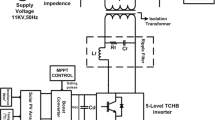Abstract
In this work, a four-switch Voltage Source Inverter (VSI) is considered for highly efficient and low power solar PV grid-connected applications to optimize the cost and size of the PV system. The Perturb and Observe (P&O) Maximum Power Point Tracking (MPPT) technique is used to track Maximum Power Point (MPP) of solar PV. This technique is simple, easy to design, and less complexity. By using two-leg four-switch inverter (B-4 inverter) the cost of the PV system can be reduced compared to six switch inverters, as the cost of inverter mainly depends on the cost of semiconductor switches. The boost converter is utilized to step-up the PV voltage. This work is to analyze the Space Vector Pulse Width Modulation Technique (SVPWM) in two-leg B-4 inverter topology to reduce the ripples at time of switching thereby reducing the Total Harmonic Distortion (THD) and reducing the inverter switching and conducting losses at high pulse width modulation frequency. Moreover, SVPWM technique improves the utilization factor of B-4 inverter. The results are analyzed by using MATLAB Simulink window.
Access this chapter
Tax calculation will be finalised at checkout
Purchases are for personal use only
Similar content being viewed by others
References
Rojas, C.A., et al.: DC–DC MMC for HVdc grid interface of utility-scale photovoltaic conversion systems. IEEE Trans. Ind. Electron. 65(1), 352–362 (2018)
Kamala, D.V., et al.: A modified Perturb & Observe MPPT technique to tackle steady state and rapidly varying atmospheric conditions. Sol. Energy 157, 419–426 (2017)
Rani, C., Basha, Ch H.: A review on non-isolated inductor coupled DC-DC converter for photovoltaic grid-connected applications. Int. J. Renew. Ener. Res. (IJRER) 7(4), 1570–1585 (2017)
Lee, H.H., Dzung, P.Q., Thanh, H.T.: The adaptive space vector PWM for four switch three phase inverter fed induction motor with DC-link voltage imbalance. In: TENCON 2008-2008 IEEE Region 10 Conference. IEEE (2008)
Su, J., Sun, D.: Model predictive torque-vector control for four-switch three-phase inverter-fed PMSM with capacitor voltage offset suppression. In: 2017 20th International Conference on Electrical Machines and Systems (ICEMS). IEEE (2017)
Rani, C., Basha, Ch H., Odofin, S.: Analysis and comparison of SEPIC, Landsman and Zeta converters for PV fed induction motor drive applications. In: 2018 Internat 2018 International Conference on Computation of Power, Energy, Information and Communication (ICCPEIC) Ional Conference on Computation of Power, Energy, Information and Communication (ICCPEIC). IEEE (2018)
Rani, C., Basha, ChH., Odofin, S.: Design and switching loss calculation of single leg 3-level 3-phase VSI. In: 2018 Internat 2018 International Conference on Computation of Power, Energy, Information and Communication (ICCPEIC) Ional Conference on Computation of Power, Energy, Information and Communication (ICCPEIC). IEEE (2018)
Lee, H.H., Dzung, P.Q.: Dynamic adaptive space vector PWM for four switch three phase inverter fed induction motor with compensation of DC-link voltage ripple. In: PEDS 2009. International Conference on Power Electronics and Drive Systems, 2009. IEEE (2009)
Peng, X., et al.: Opposite vector based phase shift carrier space vector pulse width modulation for extending the voltage balance region in single-phase 3LNPC cascaded rectifier. IEEE Trans. Power Electron. 32(9), 7381–7393 (2017)
Liu, F., et al.: A variable step size INC MPPT method for PV systems. IEEE Trans. Ind. Electron. 55(7), 2622–2628 (2008)
Dasgupta, S., et al.: Application of four-switch-based three-phase grid-connected inverter to connect renewable energy source to a generalized unbalanced microgrid system. IEEE Trans. Ind. Electron. 60(3), 1204–1215 (2013)
ELbarbary, Z.M.S., Hamed, H.A., El-kholy, E.E.: Comment on ‘A performance investigation of a four-switch three-phase inverter-fed IM drives at low speeds using fuzzy logic and PI controllers’. IEEE Trans. Power Electron. (2017)
Acknowledgements
I would like to thank the University Grants Commission (Govt. of India) for funding my research program and I especially thank VIT University management for providing all the facilities to carry out my research work.
Author information
Authors and Affiliations
Corresponding author
Editor information
Editors and Affiliations
Rights and permissions
Copyright information
© 2020 Springer Nature Singapore Pte Ltd.
About this paper
Cite this paper
Hussaian Basha, C., Govinda Chowdary, V., Rani, C., Brisilla, R.M., Odofin, S. (2020). Design of SVPWM-Based Two-Leg VSI for Solar PV Grid-Connected Systems. In: Das, K., Bansal, J., Deep, K., Nagar, A., Pathipooranam, P., Naidu, R. (eds) Soft Computing for Problem Solving. Advances in Intelligent Systems and Computing, vol 1048. Springer, Singapore. https://doi.org/10.1007/978-981-15-0035-0_71
Download citation
DOI: https://doi.org/10.1007/978-981-15-0035-0_71
Published:
Publisher Name: Springer, Singapore
Print ISBN: 978-981-15-0034-3
Online ISBN: 978-981-15-0035-0
eBook Packages: Intelligent Technologies and RoboticsIntelligent Technologies and Robotics (R0)




